REQUIRED AND SUGGESTED READING AND VIEWING
REQUIRED BOOK

We expect everyone to read Beautiful Souls: Saying No, Breaking Ranks, and Heeding the Voice of Conscience in Dark Times. The author of the book, Eyal Press, will Skype into the Academy to talk to us about the book and we will discuss moral courage in relation to our recent films telling stories of righteous gentiles, and also our Survival in Sarajevo film.
Here you can buy the book in English.
Watch an interview with the author.
REQUIRED PODCAST

LISTEN TO THE BBC PODCAST "Europe Moves East", in which Allan Little looks at the changing dynamic of the European Union.
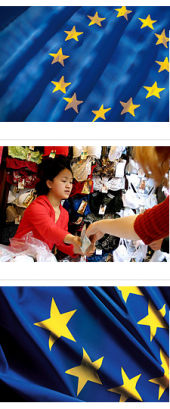 The Europe that Britain joined forty years ago was a small and loose association of nations on the western edge of the continent. Germany was still divided, with its capital in the sleepy town of Bonn near the Belgian border. France - with its long-standing commitment to the sovereignty of nation states - was the driving force of the European project.
The Europe that Britain joined forty years ago was a small and loose association of nations on the western edge of the continent. Germany was still divided, with its capital in the sleepy town of Bonn near the Belgian border. France - with its long-standing commitment to the sovereignty of nation states - was the driving force of the European project.
But the last decade has seen a profound and irreversible shift. Europe's centre of gravity has moved east. After reunification in 1990, a much more powerful Germany has emerged. The countries of the old Eastern bloc look to Berlin for leadership. Their experience of Soviet occupation and communist dictatorship has committed them to building a much stronger and more tightly integrated Europe, one that will help secure their young and still vulnerable democracies. "I want the European Union to become a superpower," the Polish Foreign Minister Radek Sikorski tells the programme. This changing dynamic is the subtle, hidden undertow to the continuing tensions over the Euro.
Forty years ago the European project was shaped by those who had survived the Second World War on the Western Front. Now, more and more, it is being driven by those who lived through the brutality and horror of the Eastern Front, and who endured forty years of communist oppression.
Power in Europe shifted, from the old and familiar Paris-Bonn relationship to the new and much more dynamic Berlin-Warsaw. This is the new Europe. It is one in which France - once the unchallenged leading voice - is increasingly marginalised. Itt is one in which Britain seems, increasingly, reluctant to stay part of.
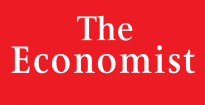 REQUIRED ARTICLE
REQUIRED ARTICLE
Read this Economist article about "Europe's reluctant hegemon" - Germany.
Now the dominant country in Europe, it needs to rethink the way it sees itself and the world, says Zanny Minton Beddoes.
SUGGESTED BOOK
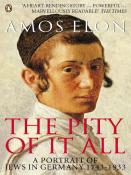
We highly suggest The Pity of It All by Amos Elon. Here is a link to the amazon page so you can order the book in English, and here is a page for ordering the same book auf deutsch. Here is a page for ordering the book in Hebrew.
Here is an insightful review of Elon’s book in The Guardian in English, and here is a review in German in the Frankfurt Allgemeine Zeitung. This is a review of the book in Hebrew. It can be found on Yad Vashem’s site.
Here is a poignant article about Amos Elon, a Viennese-born, Israeli journalist, written by Tony Judt in 2009, just after Elon died.
SUGGESTED BOOK
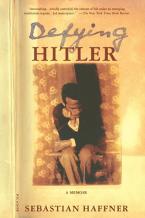
Defying Hitler, by Sebastian Haffner.
When newspaper writer, editor and historian Sebastian Haffner died in 1999 at the age of 91, his son found a manuscript he had written in 1939, after he had fled Germany for England. Haffner, known for his best selling book, The Meaning of Hitler (English title) and other histories of Germany, had never thought to publish this very personal memoir. His son did publish it a few years later, and it soared to the top of the best-seller list, where it remained for 42 weeks.
What makes Defying Hitler (not really an apt title) so fascinating is that we do not see the Nazis from today’s vantage point. We don’t see Adolf Hitler as a crumpled, hysterical wreck in the bowels of his bunker. We see them and him, in all their strutting boorishness, just at the peak of their powers. Haffner’s assessment of the German character rankled more than a few Germans, who insisted that he wrote the book--not in 1939--but shortly before his death, as he surely could not have been so prescient. The orignal manuscript was then submitted to exhaustive tests, which proves this elegant, short, and very well written and translated memoir was indeed written during the eye of the storm. That is why we would like all our participants to read it. The book really does show how so many people “went along to get along.”
Here is a link to the book in English. And here it is in German.
SUGGESTED READINGS (JEWS AND GERMANS)
Dreams and Delusions by Fritz Stern. Some excellent essays here. His Five Germanies I have Known is good but not great because he keeps running in front of the camera to talk about himself. Stern’s masterwork is Gold and Iron, the story of Bismarck and his Jewish banker, Gerson von Bleichröder.
The German Jewish Dialogue, edited by Ritchie Robertson. A compendium of essays, articles, fiction on this always troubled relationship.
My German Question is Peter Gay’s quite good memoir of growing up Jewish in Germany while his Freud, Jews and other Germans contains some very prescient essays.
Anything you can lay your hands on by Gershom Sholem is worth reading; his letters insightful and sharp. He hardly bought into the German-Jewish symbiosis and there are three essays in Jews and Judaism in Crisis that absolutely bristle with anger.
The Poet Dying: Heine’s last years in Paris by Ernst Pawel. You can knock this off in a few hours. A fine assessment of the master of irony.
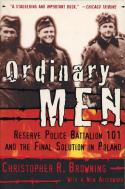
SUGGESTED READINGS (HOLOCAUST-RELATED)
The Holocaust, by Wolfgang Benz. Concise and to the point. By one of Germany’s leading scholars
Bloodlands, by Timothy Snyder. Snyder is one of the most important historians working today and this study is based on years of archival research in Poland, Russia, Lithuania, Germany and Ukraine. This book details how both Stalin and Hitler treated the lands between them--the Baltics, Poland and Ukraine, and how many people they shot, starved and gassed. A very powerful historical study. It is one of the most important books written on the Holocaust in the past decade.
All or Nothing by Jonathan Steinberg. A portrait that compares German with Italian troops in five common war zones, most of them in the Balkans. The summary at the end is devastating. A very important book.
The Gestapo and German Society by Robert Gellately. Only two cities did not have their SS records destroyed, and Gellately explores the relationship between the unpaid informers and the SS. Not a pretty conclusion.
Ordinary Men, by Christopher Browning. Truly a landmark study. This short book details how a group of reservists from Hamburg, many of which had exhibited no hardline Nazi tendencies, turned themselves into brutal murderers. There are very difficult chapters to read regarding atrocities, but these are what Browning uses to set up his conclusion.
Highly recommended: click here to read the transcript of a discussion between Daniel Goldhagen (Hitler’s Willing Executioners) and Christopher Browning.
ONLINE DOCUMENTARIES
A BBC re-enactment of Hermann Goering's Nuremberg trial.
Re-enactment of Albert Speer's Nuremberg trial.
Matt Frei, a German working for BBC, produced an excellent series on Berlin. The quality is a bit fuzzy, and they are divided into short pieces, but it's well worth it as Matt Frei is an exceptional journalist. Here's Episode one.
This BBC/HBO feature film is definitely not a documentary, but is rather a feature film on the Wannsee Conference. It was filled in the Wannsee Villa and stars Stanley Tucci as Eichmann and Kenneth Branagh as Heydrich. We found it to be excellent, gripping.
The Cold War was a documentary series narrated by Kenneth Branagh. An exceptionally good cast of interviewees peppers these episodes and we highly recommend it, even though it covers much more than Germany itself. There are a whopping 24 episodes, each of them 46 minutes, but if you hunt around, you'll find relevant ones for Germany, and here is the first episode.
An exceptionally poignant short piece by freelance photographer Antony Suau about how he took one of the iconic photos of the fall of the Berlin Wall.
GREAT FILMS IN FULL LENGTH ON YOUTUBE - ABOUT OR FROM GERMANY
The Blue Angel, Joseph von Sternberg's great Weimar-era film, stars Emil Jannings and a remarkably young Marlene Dietrich, is based on Heinrich Mann's novel, Professor Unrat.
Perhaps the greatest of all Weimar-era films is M, by Fritz Lang. Peter Lorre plays a child killer and until he is caught, the police puts the screws on Berlin's criminal class. They, in turn, go hunting for M. Not to be missed.
Fritz Lang's 1927 German expressionist movie Metropolis inspired Queen for their video "Radio Ga-Ga" - and is regarded as a pioneer work of science fiction movies, being the first feature length movie of the genre. The Film Museum Berlin has a special section on this film alone.
A Foreign Affair, a brillant comedy directed by Billy Wilder in 1948 and starring Marlene Dietrich and Jean Arthur, takes us into post-war Berlin. The film is about a United States Army captain in occupied Berlin who is torn between an ex-Nazi cafe singer and the US congresswoman investigating her. A must-see.
The greatest of all cold-war comedies is One, Two, Three, a film by Billy Wilder and starring Jimmy Cagney in his last major film role. Set in 1961 just weeks before the Berlin Wall went up, it's one of Wilder's best.
This film should definitely not be on Youtube, but so long as it is, you may as well grab it. Goodbye Lenin (2003) is a comedy that with an insane premise: Shortly after the fall of the Berlin Wall in 1989, a young East Berliner (played by Daniel Bruehl) is told his mother will die if she finds out--after a massive heart attack--that her beloved East Germany has vanished. So he re-invents the GDR--in their apartment. We liked it very much.
A Woman in Berlin. This is not an easy film to watch, and is based on the diary of a journalist who was, like hundreds of thousands of other German women, repeatedly raped by Soviet soldiers after the city's capitulation. A well made film.
Here's a very rare film indeed. The Fall of Berlin was a hugely-budgeted, spectacular Soviet propaganda film, produced by an order from Stalin. It's pretty awful but definitely worth watching anyway. It appeared in two parts in 1950.
Downfall is Oliver Hirschbiegel's Academy-award winning film on the last days of Hitler in his Berlin bunker at the very end of the war. Bruno Ganz is excellent as Hitler.
Another German academy award winner: Florian Henckel von Donnersmarck's The Lives of Others, is a remarkably good film about an East German writer and the Stasi spy who listens in on him.
Arguably post-war Germany´s most influential filmmaker, Rainer Werner Fassbinder directed the so-called BRD-Trilogy in the late 1970s and early 1980s. You can watch all three on them on youtube, but if you have only time for one of them, we suggest The Marriage of Maria Braun. The film stars Hanna Schygulla as Maria, whose marriage to the soldier Hermann remained unfulfilled due to World War II and his post-war imprisonment. Maria adapts to the realities of post-war Germany and becomes the wealthy mistress of an industrialist, all the while staying true to her love for Hermann. The film was one of the more successful works of Fassbinder and shaped the image of the New German Cinema in foreign countries.
Run, Lola, Run (1998) put the young German director Tom Tykwer on the map. A story of a bank robbery told three ways. Fast-paced, entertaining film.
Das Boot is the best German war film ever made. The director's cut is definitely not. It's dubbed in English--not subtitled, but it's still worth the watch, if you have three hours to spend in a tiny submarine with 90 Germans.
Last but not least, two of the major silent films from 1920s Weimar Germany:
Nosferatu, directed by F.W. Murnau and released in 1922, is an expressionist horror film based on Bram Stoker`s Dracula novel.
Die Sinfonie der Großstadt / Symphony of a Great City by Walter Ruttmann takes you into Weimar-era Berlin. During the Nazi period Ruttmann worked as an assistant to director Leni Riefenstahl on Triumph of the Will.
SUGGESTED FILMS TO RENT
Holocaust/war-related
Underground—Hitler’s last days. The guy who plays Goebbels does a great Joel Gray.
The Counterfitters. Won the Academy Award for best foreign film. No surprises but well told.
Contemporary
Wings of Desire. Wim Wenders’ great, simply unmissable film for all of you
The Miracle of Bern. A nice little film of postwar Germany and the soccer game of the century, a returning POW father and his son. Two hankies.
Headlong. Very well made modern film of troubled youth
NEWS
Der Spiegel offers you a look at the bewildering array of political parties in Germany today.
Der Spiegel has an entire English language section that makes for indispensable reading.
Here's a very useful link. Jewish Voice from Germany is an English-language publication.
The Daily Telegraph (UK) posts articles it runs related to Germany.
The Local is a website that conglomerates German news. Well worth it.
BBC's vitally important Germany profile. Note the tabs at the top of the page for further reading.
We suggest the New York Times Article "The Antagonist as Liberator" about Daniel Goldhagen's book "Hitler's Willing Executioners: Ordinary Germans and the Holocaust,'' and about Germans' relationship with their past.
SUGGESTED READINGS (MEMOIRS AND REPORTAGE)
Marcel Reich Ranicki’s The Author of Himself. The ‘pope of German literature’ for 20 years was a Jew who was on TV each week and had millions of viewers, who loved listening to him savage novels and novelists with gleeful abandon. This is his quite well written memoirs of growing up in Berlin and Warsaw. The postwar stuff will not interest you much unless you happen to live German newspaper politics.
Joseph Roth’s What I saw: Reports from Berlin, 1920-1933. For those of us who love Roth, here is a collection of his newspaper pieces. Still brilliant.
SUGGESTED READINGS (CONTEMPORARY FICTION)
Heroes Like Us by Thomas Brussig. A very funny novel by a highly successful young East Berlin novelist. He knows why the Berlin Wall came down. It has to do with his...never mind, just read it.
The Invention of Currywurst by Uwe Timm. A nice little story of hiding out in Hamburg during the Allied bombing.
The Summer House, Later by Judith Hermann. A huge success among young German women. We didn’t get it.
33 Moments of Happiness by Ingo Schulz. Quite a hit, clever short pieces. Extremely well received.
Bernhard Schlink’s The Reader met with much success in the US and in Germany. Serious literary reviewers ripped it apart as a thinly veiled attempt to paper over the sins of the past. We did not see that.
Jurek Becker: Jacob the Liar. A genuinely moving novel of a young man in a concentration camp. By one of Germany’s few important Jewish novelists who died much too young.
WG Sebald’s The Emigrants hit the literary world by storm. A strange collection of stories and old postcards and pictures. Haunting, powerful.
Measuring the World by Daniel Kehlmann. Easily the hottest young German novelist going. His books are well translated and this is his tour de force.
SUGGESTED READINGS (WORLD WAR II)
Armageddon by Max Hastings. An excellent account of the war from the Allied side from the fall of Paris in August 1944 until the fall of Berlin in May 1945.
The Fall of Berlin by Antony Beevor, which is a companion piece to his Stalingrad. He and Hastings are among the our favorite military historians.
